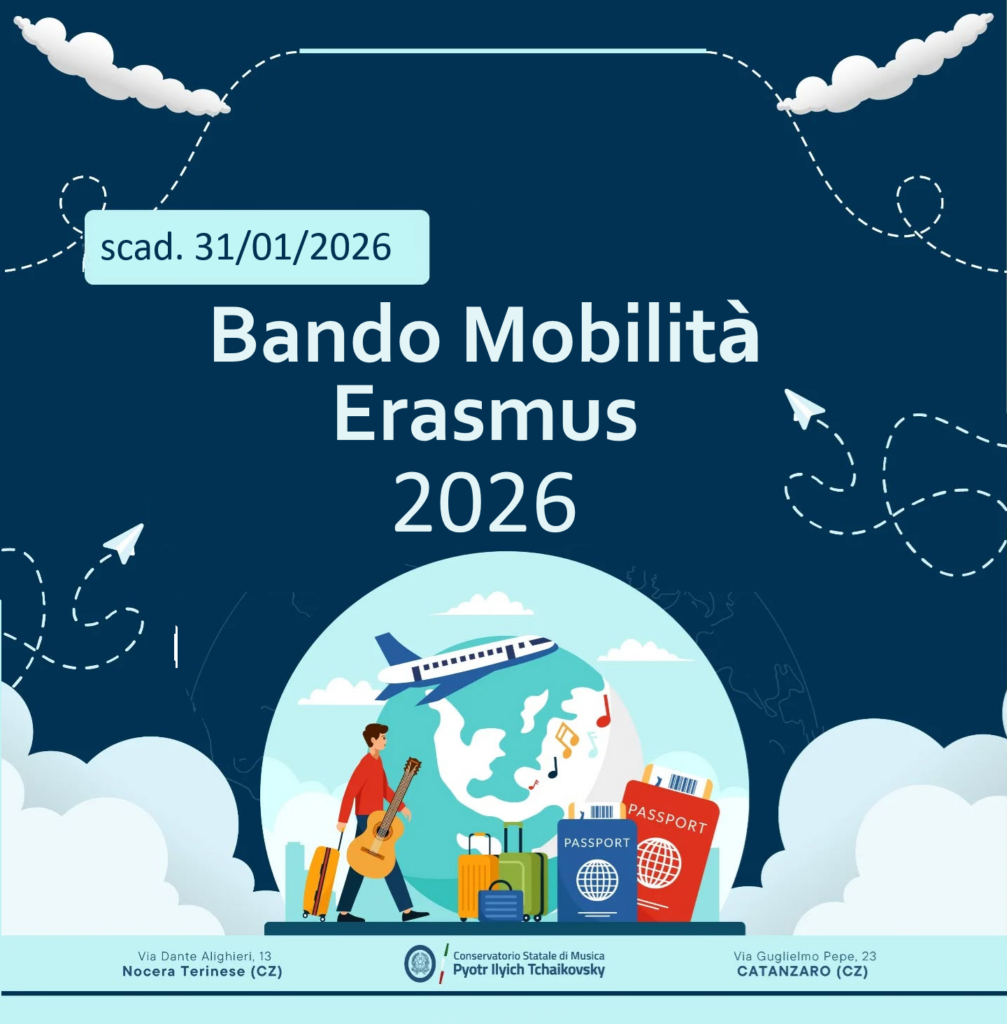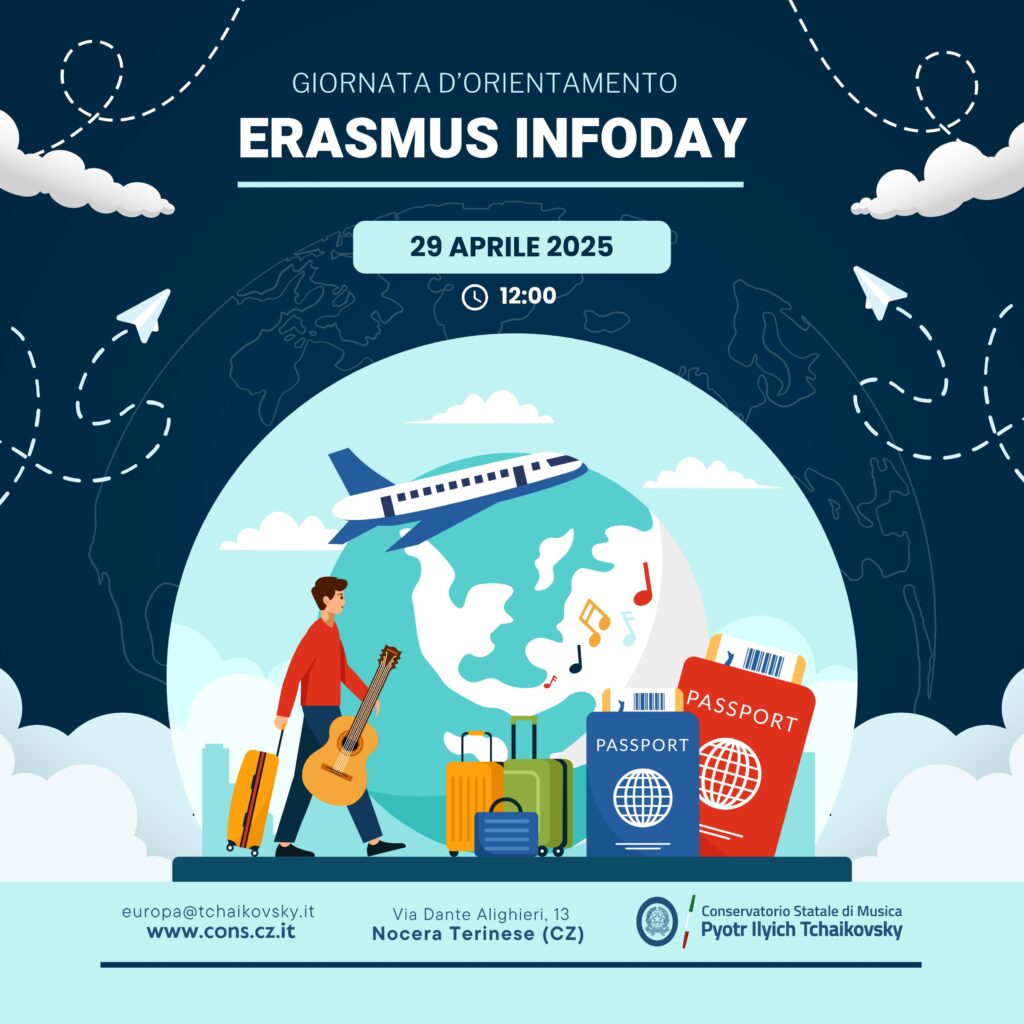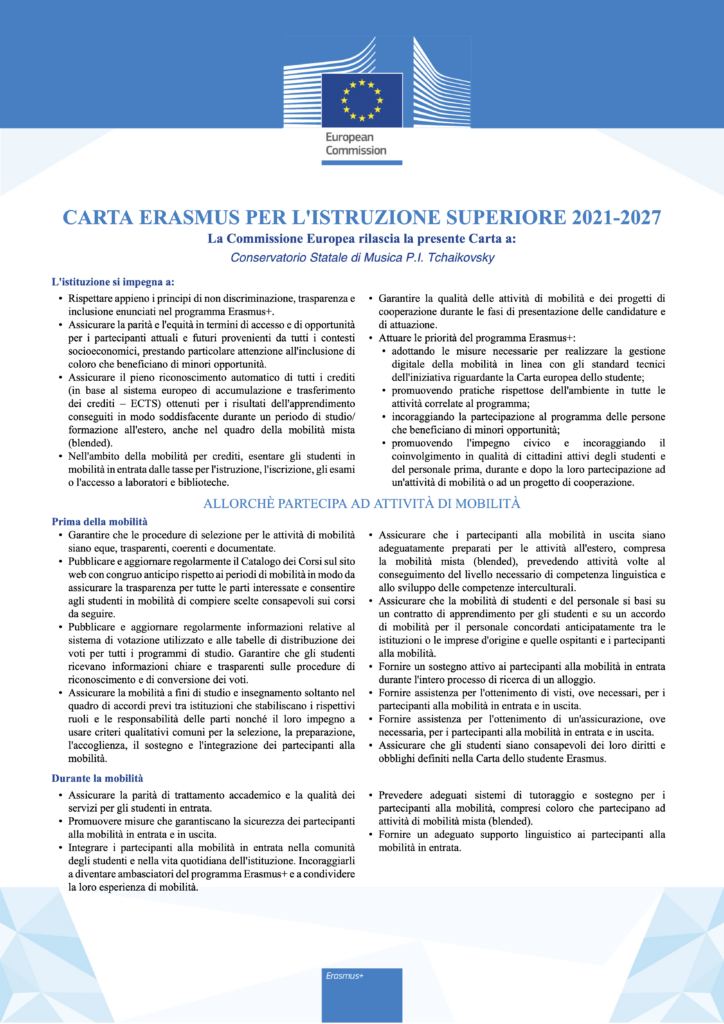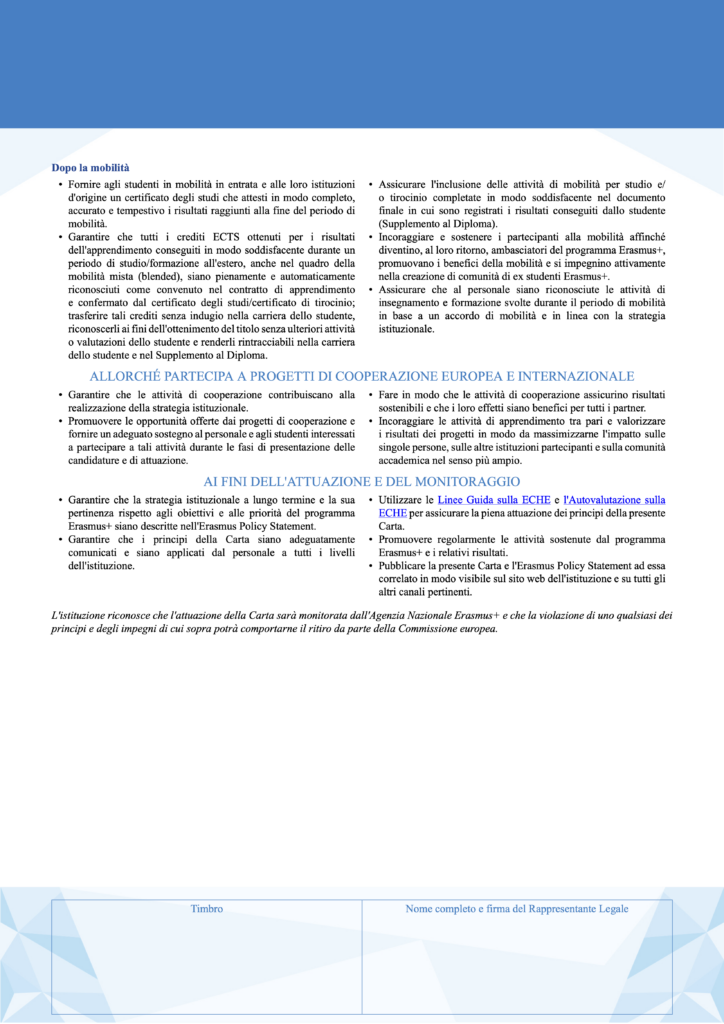

SECONDO VERBALE COMMISSIONE VALUTAZIONE DOMANDE STAFF MOBILITY AGREEMENT FOR
TEACHING (STA) E STAFF MOBILITY AGREEMENT FOR TRAINING (STT)
GRADUATORIA PROVVISORIA – a.a. 2025/2026

SECONDO VERBALE COMMISSIONE VALUTAZIONE DOMANDE MOBILITÀ ERASMUS TIROCINANTI
(SMP) E GRADUATORIA PROVVISORIA
VERBALE COMMISSIONE VALUTAZIONE DOMANDE MOBILITÀ ERASMUS STUDENTI (SMS) E GRADUATORIA PROVVISORIA
Erasmus Infoday

NEWS AEC ➡ leggi di più …
Esperienze…
ERASMUS+
ECHE 2021 – 2027
Erasmus Policy Statement
| Participation in Erasmus+ |
| Conservatory “P.I. Tchaikovsky” of Nocera Terinese (CZ) is located in the South of Italy, in the Calabria region. It is a growing reality, young and lively, which operates in a peripheral region of European Union, not only geographically, but also social and economic. The Conservatory is committed for years in the promotion of musical culture on the territory, in order to contribute to the spread of “high culture” as unavoidable process of social redemption and support to processes that disseminate the values of merit and quality. In this context, the implementation of a relations program and international exchange constitutes a major strategic initiative for the whole area, which, through the Institute’s action, acquires deficit recovery opportunities and the development of resources that can be driving force for other sectors of the local reality. Also, the mobility actions and partnerships with similar institutions of other European Union Countries, the Mediterranean and emerging countries outside Europe, will be a way to make the idea of Europe more tangible and encourage integration, through the concrete participation in cultural, economic, social and education processes at community level. In fact, the Conservatory considers the promotion of the international dimension of studies, teaching, scientific research and artistic and professional education, a fundamental aspect for the construction of a European and International Space of high music education. |
| Strategy, objectives and impact |
| The main objectives of the Conservatory’s participation in the Programme are: – Support the promotion and dissemination of opportunities arising from the Erasmus+ Programme, through specific accompanying measures for students and staff.Consolidate and expand the network of inter-institutional relations with Music Conservatories, Academies and foreign Universities, with the aim of developing joint research, educational and artistic production, specialization and master classes, and promote the exchange of students, teachers and technical staff. Open up to new collaborations with any institute of higher education with which it is possible to implement a plan of international relations consistent and appropriate to the path of “Tchaikovsky” Conservatory institutional development.Strengthen the relations of cooperation particularly productive in terms of both teaching and artistic established with the Institutes of Higher Education non-European of the Mediterranean area. Broaden the partnership networks with EU Countries, especially with those that allow further employability opportunities and employment prospects, besides the student andf staff mobility. Also, there is a particular desire to strengthen relationships and create new partnerships with institutions of Countries with a historically valuable music tradition.Expose students to rich learning experiences which would expand their skills, cultural awareness, employability and practice.Allow members of staff to encounter, explore and experience new learning and teaching practices for their personal and professional development.Attract staff and students who can get to know an Italian small music institution (i.e. with a less International vocation compared to other national institutions in bigger cities) that is strongly embodies within regional and local communities and culture.The participation in the Erasmus + Programme will have a positive impact because it will: a) Produce an enrichment of training offer and be able to attract new students through mobility and International Cooperation; b) Strengthen and expand cooperation and exchanges of good practices with EU and Extra-EU HEIs and other strategic partners such as orchestral and theatrical institutions; c) Improve the cultural and artistic background of students and teachers and allow them to develop their own artistic career, be more competitive and more responsive to the needs of labour market. This will be encouraged by involvement in activities, artistic productions and international research. d) Promote the innovative development of research and educational, artistic and scientific experimentation, because it will allow the profitable comparison between different teaching methods and the inclusion of them in the formative proposal of our institution; e) Draw up a clear policy to developing of integrated and transnational didactic activities with the labour market through the traineeships activities for students that will ensure increased career guidance; f) Support the quality of human capital enhancing and upgrading the skills of its teachers and administrative staff and allowing the exchange of knowledge and experience at the international level; g) Introduce the culture of excellence and merit because it will tend to reward who will be most deserving and work more; h) Open the mind to the cultural and social inclusion and will allow a greater awareness of EU citizenship status. We expect that after participation in the Erasmus + Programme, teachers, staff and students will become more aware about the importance of mobility for the increase of educational and vocational training quality. Also, the comparison of organizational and management systems of resources among other HEIs will be very useful for improving the effectiveness of governance arrangements and financing of activities. We hope that the third cycle of higher education (PhD) can be activated in synergy with other international institutions to ensure excellence and an optimal education to the participating European students. |
| Indicators |
| Key success indications of the Erasmus+ initiatives would be:Raising awareness of mobility and partnership opportunities, both internally and externally:- dedicated pages, content and resources on the institution website;- a rich mailing list of students, staff, and stakeholders;- community engagement activities, in collaboration with schools, local government institutions and the third sector.Be able to reach at least 20 students in outgoing mobility until the end of the programme, or 7 students per academic year. The following broad indicators shall be used:Target minimally achieved with at least 30% of outgoing mobility students for each academic year;Target partially achieved with at least 50% of outgoing mobility students for each academic year;Target fully achieved with at least 70% of outgoing mobility students for each academic year;For incoming mobility, considering the peripheral location of the institution and the availability and quality of public transportation in the area, the target is considered fully archived with 5 incoming students until the end of the programme. A detailed action plan for searching, contacting, and leasing with potential partner institutions. The target will be fully achieved if at least 3 partnership agreement are finalised by the end of the programme. This is in consideration of the ECHE application being submitted in early 2023 instead that at the start of the programme call, therefore any mobility actions will be implemented starting from the 2023-2024 academic year. Active and regular dialogue with existing institutional partners around the added value of the Erasmus+ Programme framework, ideally with the redefinition of existing agreements. Negotiated learning plans, regular tutoring, and mentoring activities for mobility learners Dissemination opportunities for mobility staff and learners, through ad-hoc and existing institutional and community events and media. This target will be fully achieved if at least 5 outgoing mobility staff and 5 ingoing mobility staff by the end of the programme. |
Ufficio Relazioni Internazionali / International Office
L’ufficio Relazioni Internazionali è gestito dal Coordinatore Erasmus+ (contatti: europa@tchaikovsky.it – +39 0968923854), coadiuvato dai membri della segreteria amministrativa dell’Istituto.
Il Coordinatore:
– Intrattiene i rapporti con i referenti delle Istituzioni partner europee- cura le relazioni con gli studenti e il personale in entrata e in uscita, anche relativamente a borse di studio, accoglienza, alloggio
– Si occupa di predisporre il Learning Agreement, il Transcript of Records e il Diploma Supplement. Lo staff amministrativo comunica le attività, le informazioni e le procedure relative al programma Erasmus+ tramite affissione nelle bacheche dell’Istituto e tramite web.
L’Ufficio offre pieno ed equo supporto a tutti i partecipanti in mobilità, favorisce la loro integrazione e reintegrazione nella vita dell’Istituto e promuove i programmi internazionali.
Sistema europeo di accumulazione e trasferimento dei crediti (ECTS)
L’Istituto ha adottato il sistema ECTS per garantire la qualità e la trasparenza del riconoscimento degli studi anche a livello internazionale.
Tale sistema si basa sulla quantificazione del carico di lavoro richiesto agli studenti per raggiungere i risultati di apprendimento attesi dal corso di studio. 60 crediti ECTS vengono attribuiti al carico di lavoro previsto per un Anno Accademico (1 credito ECTS per 25-30 ore di lavoro complessivo), attraverso il superamento degli esami o delle verifiche previste nelle singole discipline.
Gli studenti che hanno conseguito crediti presso istituti stranieri al rientro dal loro periodo di mobilità presentano il Transcript of Records rilasciato dall’Istituto partner. Il ToR, corrispondente al Learning Agreement inizialmente concordato tra lo studente e le due Istituzioni oppure aggiornato durante il soggiorno di studi, certifica i corsi seguiti in mobilità e i relativi crediti.
Catalogo dei corsi / Course Catalogue
Il Conservatorio svolge anche attivitàà di produzione e rilascia, alla conclusione dei percorsi formativi, specifici diplomi accademici di primo e secondo livello (c.d. 3+2), di specializzazione, di perfezionamento e di formazione alla ricerca nel campo artistico e musicale.
I piani di studio sono improntati agli standard europei e al sistema dei crediti formativi secondo i principi dello European Credit Transfer System. Con il sistema dei crediti formativi universitari (CFU), per conseguire il diploma accademico di primo livello gli studenti devono aver acquisito 180 crediti nell’arco di tre anni, mentre per il diploma accademico di secondo livello devono averne acquisiti 120 in due anni.
Corsi di lingua / Language Course
l’Istituto Superiore di Studi Musicali “P.I.Tchaikovsky” attiva corsi di lingue sia nell’ambito della propria offerta didattica (anche in modalità E-learning) e sia avvalendosi della collaborazione di Centri Linguistici esterni specializzati per preparare gli studenti e lo staff in mobilità in entrata e in uscita.
In particolare, i partecipanti che desiderano studiare al Tchaikovsky o partire per un soggiorno di studi Erasmus all’estero possono seguire corsi di lingua italiana e delle principali lingue europee (tra le quali inglese, russo, tedesco) che permettano loro di raggiungere il livello di padronanza linguistica richiesto per poter seguire i corsi concordati nel Learning Agreement e indicati nel Catalogo dei Corsi dell’Istituzione partner.
Riconoscimento attività di studio al rientro / After Mobility
Al rientro dei partecipanti in mobilità, L’Istituto riconosce pienamente tutte le attività di studio svolte presso l’Istituzione partner che vengono inserite nella carriera personale dello studente.
Tutti i crediti acquisiti dagli studenti in mobilità in entrata secondo il piano di studio approvato (Learning Agreement) vengono trasferiti e certificati nel Transcript of Records (indicando le denominazioni originali delle unità formative).
I crediti ottenuti durante la mobilità vengono utilizzati per soddisfare specifici requisiti curriculari necessari all’ottenimento del titolo di studio. Successivamente, i crediti ottenuti vengono inclusi nel Diploma Supplement con la specificazione dell’Istituto presso il quale sono stati ottenuti.
Processo di Bologna / Bologna Process
Il Processo di Bologna è un processo di riforma a carattere europeo che si propone di realizzare uno Spazio Europeo dell’Istruzione Superiore.

